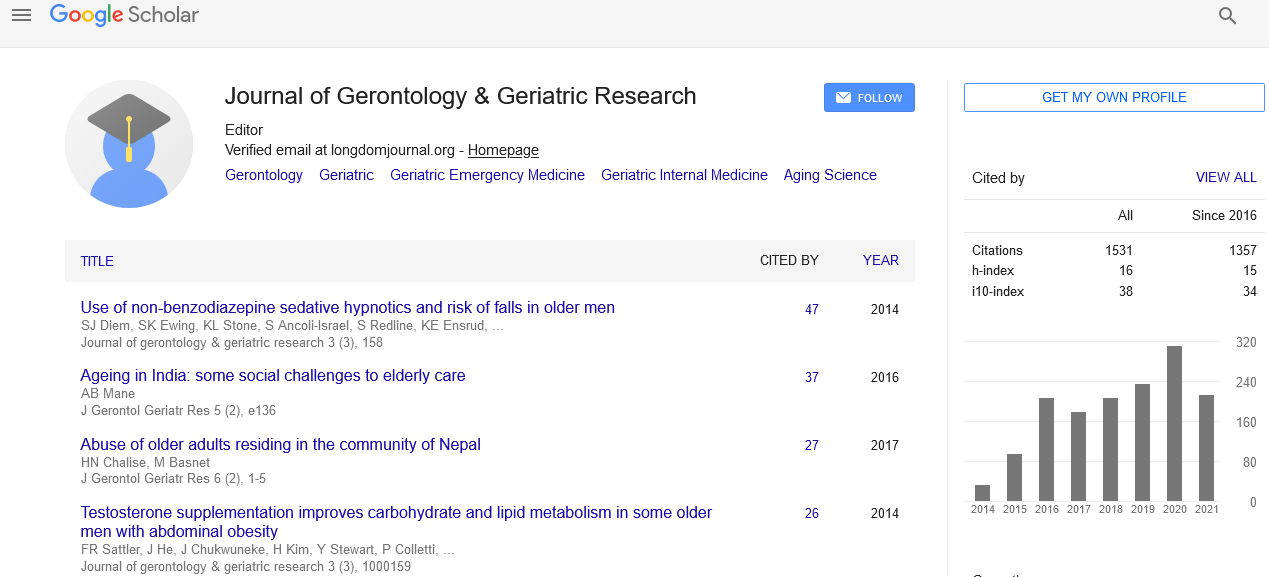PMC/PubMed Indexed Articles
Indexed In
- Open J Gate
- Genamics JournalSeek
- SafetyLit
- RefSeek
- Hamdard University
- EBSCO A-Z
- OCLC- WorldCat
- Publons
- Geneva Foundation for Medical Education and Research
- Euro Pub
- Google Scholar
Useful Links
Share This Page
Journal Flyer

Open Access Journals
- Agri and Aquaculture
- Biochemistry
- Bioinformatics & Systems Biology
- Business & Management
- Chemistry
- Clinical Sciences
- Engineering
- Food & Nutrition
- General Science
- Genetics & Molecular Biology
- Immunology & Microbiology
- Medical Sciences
- Neuroscience & Psychology
- Nursing & Health Care
- Pharmaceutical Sciences
Pattern and appropriateness of prescribing medications to elderly outpatients in Gondar University Referral Hospital, Gondar, Northwestern Ethiopia
International Conference on Geriatrics & Gerontology
July 08-10, 2014 DoubleTree by Hilton Hotel Chicago-North Shore Conference Center, USA
Fitsum Sebsibe Teni
Accepted Abstracts: J Gerontol Geriat Res
Abstract:
Inappropriate prescribing to the elderly causes substantial morbidity, and has become an important public-health issue worldwide. The aim of this study was to assess the pattern and appropriateness of prescribing medications to elderly outpatients in Gondar University Referral Hospital. A cross-sectional study was conducted in the hospital from 10th of February to 5th of March 2012 using retrospective data on the diseases and medications from medical records of a sample of 392 elderly outpatients aged 60 years or older. Statistical analyses performed include chi-square and binary logistic regression. The mean age of patients was 67.8 years and average number of diseases per patient was 1.2. Certain infectious and parasitic diseases were the leading class of diseases constituting 115 (24.4%) of the total number of diseases. Anti-invectives were the most commonly prescribed medications constituting 173 (27%) of the total medications. Average number of medications per patient was 1.63 and antibiotics were prescribed during 35.5% of patient encounters. Among the 255 patients aged 65 years or older, 25 (9.8%) were prescribed potentially inappropriate medications based on 2002 Beers criteria, short acting nifedipine constituting the highest proportion. Among the 189 patients prescribed with two or more medications, 47 (24.9%) encountered at least one potential drug-drug interaction and aspirin-furosemide was the most frequently occurring pair. Number of medications (AOR=2.359, 95% CI=1.395-3.989) and diagnosis with hypertension (AOR=3.321, 95% CI=1.240- 8.895) were significant predictors of potentially inappropriate medication while number of medications (AOR=3.962, 95% CI=1.959-8.012), diagnosis with hypertension (AOR=3.669, 95% CI=1.574-8.553) and diabetes (AOR=5.003, 95% CI=1.170- 21.391) were predictors of drug interaction. Based on World Health Organization?s prescribing indicators, the pattern of prescribing was generally acceptable except for high prescription of antibiotics. However, problem with appropriateness was observed as considerable proportion of patients were prescribed inappropriate medications/medication pairs. Prescribers to update themselves on pharmacotherapy of geriatrics, preparation of clinical guideline for the treatment of the elderly by the hospital and further studies with implicit criteria and prospective approaches are among the recommended actions.
Biography :
Fitsum Sebsibe Teni, is 27 years old and got bachelor of pharmacy degree (BPharm) from Jimma University in 2008 and a Master of Science degree in Pharmacoepidemiology and Social Pharmacy from Addis Ababa University in 2013. He is currently working as a lecturer in University of Gondar School of Pharmacy in the department of Pharmaceutics and Social pharmacy as a lecturer of Pharmacoepidemiology and Social Pharmacy.


